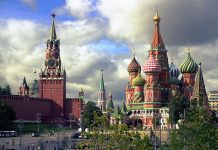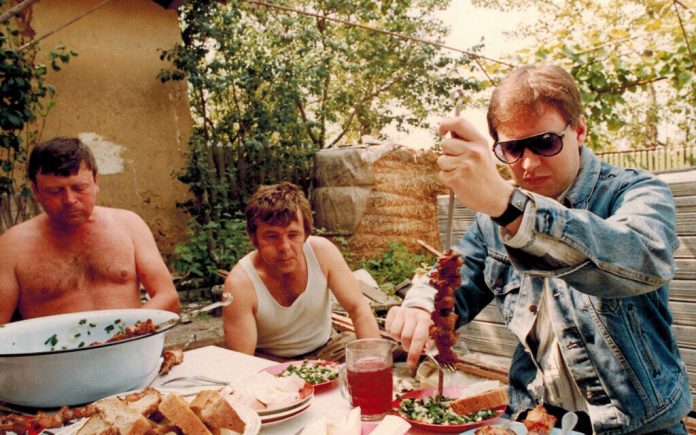He may have failed to „de-Nazify” Ukraine, but in Moldova he de-Stalinized
The gifts of Vladimir Putin have attached mostly to the civics realm: alongside catastrophes for those under his boot, the Russian leader has provided the world with a valuable lesson on the dangers of unchecked power. This week has added to his ledger: Putin has helped kill off of the fictitious language of Moldovan, thus reducing the sum of nonsense in the world.
To understand the Moldovan issue, one must imagine New World colonists whose rage over taxation without representation has overwhelmed their faculties to the point where they decide to pretend their language is not English but American—and commence printing American-English and English-American dictionaries.
To understand what actually happened, we must cast our gaze 84 years back to the moment when Nazi Germany threatened to invade Poland. Under Josef Stalin, the Soviet Union decided to use this dangerous moment to cut a sweetheart deal.
Russia had long eyed the southwestern reaches of its empire, up to and including areas inhabited mostly by Romanian speakers (and also Jews)—descendants of a wayward Roman garrison, according to lore. This had to do with access to the Danube and the seas—but also just with covetousness in the most vulgar biblical sense. As with Putin.
As part of a pact signed in August 1939 by German Foreign Minister Joachim von Ribbentrop and Soviet Foreign Minister Vyacheslav Molotov, Germany ceded a swath of territories not its own to the USSR. Soon two things happened: Nazi Germany invaded Poland, and Soviet troops marched into northeastern Romania, occupied it and declared the “Moldavian” (or Moldovan) Soviet Socialist Republic.
The Soviets knew something fundamental about the human condition that was misaligned with communism: people wanted to feel distinct, a tribal identity. A linguistic one, even.
They therefore understood that the Moldovans might one day want to reunite with their fellow Romanian speakers. Thus did the Soviet propaganda machine give rise to the fiction of a Moldovan people who were a proud member of the Soviet family of nations and who speak a Moldovan language that is very definitely not Romanian.
Radio broadcasts from Romania were jammed so that no one would know it is the same language; Romanian nationalists were oppressed, silenced, and if need be, deported; Slavs were moved in, to scramble the region’s ethnicity. Moreover, Slavic-populated areas of what should naturally be Ukraine, across the Dniester River, were appended to Moldova. To mix things up yet more, industry was concentrated there to make it inseparable from the rest of Moldova.
My own parents hail from the “Pale of Jewish settlement” that straddled the Soviet Union’s borders with what is now Eastern Europe. They were, in effect, Romanian Jews, and they escaped the post-World War II Communist regime in 1960. I grew up in Philadelphia, speaking Romanian, which enabled me to get a job with The Associated Press as the correspondent in post-Communist Bucharest.
In 1990, as the Soviet Union was falling apart, I was among the first group of people—almost all of them local Romanians—who crossed the Prut River border into the Moldovan SSR. The USSR, on its last legs, would not let my car across, and I stepped into a makeshift taxi on the other side.
“Do you speak Romanian?” I asked the driver in American-accented Romanian. He seemed genuinely puzzled and replied: “No. But I do speak Moldovan.” As far as I could tell, he was speaking Romanian, so in that language I gave him my hotel address in the capital Kishinev. We spent the hour-long drive chatting about the ridiculousness of communism, so antithetical to the human spirit. We did it in Romanian, which he called “Moldovan.”
The driver seemed deeply puzzled at my facility with his language. “Have you ever been here before?” he asked, seemingly to disbelieve my answer. Muttering to himself, probably suspected I was a spy, and he lit another vile Soviet cigarette.
On the streets of Kishinev I remember finding Romanian-Moldovan “dictionaries”—in which the latter “language” was written in Cyrillic as opposed to Latin script. I felt then that this nonsense could not possibly last much longer, but I failed to factor in something essential. When the Moldovan SSR declared independence, its leaders preferred to be presidents of a country rather than governors of a region. So the nonsense carried on for another 30 years and more.
Until now—until Putin. The Russian leader’s invasion of Ukraine, and the sense that he might go further in his assault on Western allies, has created jitters in Moldova. So the pro-Western government in Kishinev is making a play for fast-track EU membership.
And as part of that, in recent days the parliament in Kishinev has voted to declare the language of the realm to be “Romanian.” The intention, almost certainly, was to align Moldova with Romania, an EU member in reasonable standing.
Does it matter what governments decide? A friend of mine on the ground maintains that close to half the people will continue to refer to their language—in excellent Romanian—as “Moldovan.” But in time, I assess, this fiction will dissipate and disappear—much as no one today anymore says “Peking.”
There are other such examples, where culture and politics cause people to pretend they speak different languages when they actually do not. Around the same time as Moldova was declaring independence, Serbia and Croatia became independent countries after the breakup of Yugoslavia. Their common language of Serbo-Croatian was no longer a unifying force and so they commenced pretending they were different: Croatian written in Latin script, and Serbian in Cyrillic. This persists until today.
The world is full of linguistic overlaps and divergences that defy easy labels. Spanish and the Jewish language of Ladino are almost one and the same, though to be fair Ladino has largely disappeared. The Flemish in Belgium mostly accept they’re speaking Dutch. Across the Arab world people agree they’re speaking Arabic, despite huge variations. A Londoner may accept that the Scouser, the Geordie and the Scot all speak the King’s English—but might not understand them.
It is a vexing old world, lexicographically. But at least Moldovan children will finally now know, courtesy of the Russian dictator, that their language is Romanian and none other. The truth can be a bitter tonic, but it is the only one worth drinking. As they say in both Romania and Moldova before imbibing: Noroc!
“Good luck” is what it means, and we could all use a bit of that.
This article also appeared in Newsweek
and Ask Questions Later.
Russia not happy that Moldova has renamed its language ‘Romanian’

















